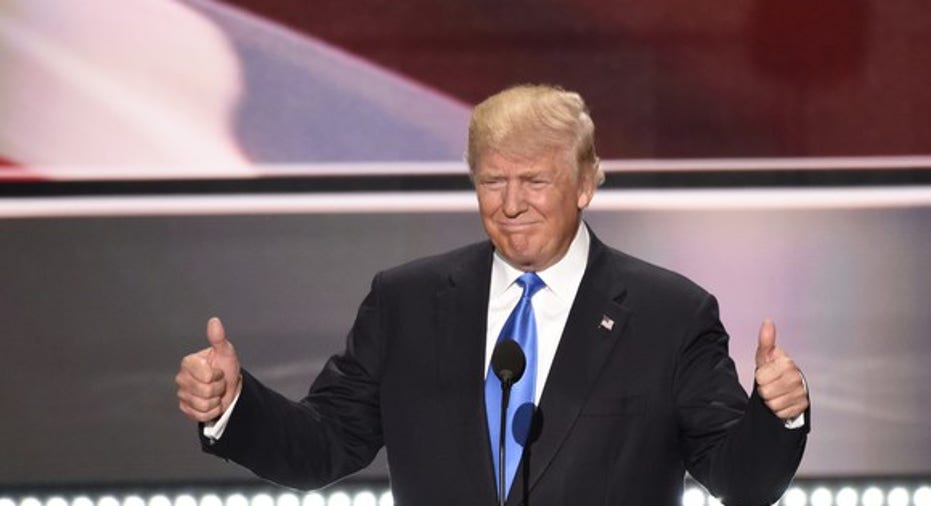How Will Gilead Sciences Fare Under President Trump?

Change is on its way in Washington, D.C. And the possible impacts for a big biotech like Gilead Sciences (NASDAQ: GILD) could be substantial. How might Gilead fare under four to eight years of President Trump?
Image source: Disney ABC Television Group via Flickr.
Negatives
Let's start with the potential negatives. Donald Trump has made it clear that he wants to allow Medicare to negotiate directly with drugmakers to secure lower prices for prescription drugs. If this proposal is enacted, it could put a dent in Gilead's earnings.
How important is Medicare to Gilead? In 2015, the federal healthcare program paid Gilead more than $10 billion for just five drugs: Atripla, Harvoni, Letairis, Sovaldi, and Truvada. That represented 38% of Gilead's total revenue from those drugs. And those drugs comprised over four-fifths of the biotech's overall revenue that year.
The extent of the impact on Gilead from allowing Medicare to negotiate drug pricing depends, of course, on how much the biotech has to discount its prices. A 10% reduction from Medicare, for example, could wipe out all the money Gilead makes from pulmonary hypertension drug Letairis and cancer drug Zydelig combined.
President Trump's relationship with China could lead to even bigger problems for Gilead. Should a trade war erupt, the biotech could be in big trouble. A significant portion of the raw products used to manufacture Gilead's antiviral products (including Harvoni, Sovaldi,Epclusa, Truvada, Atripla, and others) are made by companies in China.
Positives
There are some decidedly positive benefits that Gilead could enjoy under a Trump Administration, though. During his campaign, President Trump proposed reducing the U.S. corporate tax rate from 35% to 15%. He also talked about a one-time repatriation of cash held overseas at a discounted 10% tax rate.
If we use the mid-point of the company's full-year 2016 revenue guidance, Gilead will make around $30 billion in 2016. Roughly two-thirds of Gilead's total revenue stemmed from U.S. sales in the most recent quarter.At a 35% tax rate, the biotech would pay taxes of around $7 billion. Under President Trump's proposed corporate tax rate, Gilead would pay taxes of a little over $3 billion -- a savings of $4 billion per year at 2016 revenue levels.
What about the effect of repatriation? Gilead reported $25.2 billion in cash at the end of the third quarter that was parked overseas. (That amount has undoubtedly increased since then with the tremendous cash flow the biotech generates.)
Let's assume that President Trump's proposal is enacted and that Gilead decides to bring all of that cash back into the U.S. This would give the company more than $22.5 billion after taxes. That's a substantial sum for Gilead to use for making acquisitions or rewarding shareholders through higher dividends and/or more stock buybacks.
Assessing the overall impact
What are the chances that these potential positive and negative factors become reality? The potential for corporate tax reform, including lower overall rates and a repatriation incentive, seems pretty good. The GOP has majorities in both the Senate and the House of Representatives. Plus, Republicans are itching to change the tax system.
I'd say the prospects of allowing Medicare to negotiate drug prices are less, but a change is still quite possible. President Trump would certainly attract Democratic support and could sway some Republicans.
The likelihood of a trade skirmish with China is the big wild card. Both the U.S. and China could be harmed by a disruption of trade, so one would think and hope that the current war of words wouldn't escalate.
Taking all of this into account, I'd say the the overall impact to Gilead Sciences during Trump's presidency should be a net positive. My hunch is that the tax savings would more than make up for the negative impact from Medicare pricing changes. We should know over the next few months which proposals become policies -- and what it all means for Gilead.
10 stocks we like better than Gilead Sciences When investing geniuses David and Tom Gardner have a stock tip, it can pay to listen. After all, the newsletter they have run for over a decade, Motley Fool Stock Advisor, has tripled the market.*
David and Tom just revealed what they believe are the 10 best stocks for investors to buy right now... and Gilead Sciences wasn't one of them! That's right -- they think these 10 stocks are even better buys.
Click here to learn about these picks!
*Stock Advisor returns as of January 4, 2017
Keith Speights owns shares of Gilead Sciences. The Motley Fool owns shares of and recommends Gilead Sciences. The Motley Fool has a disclosure policy.



















